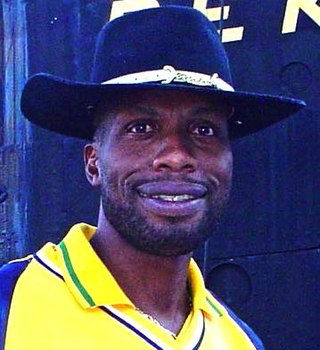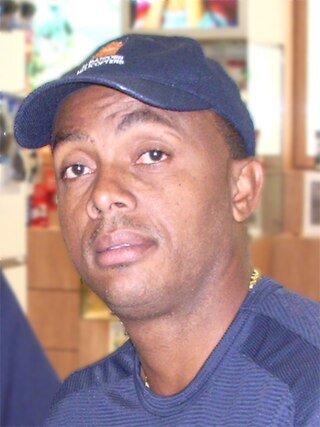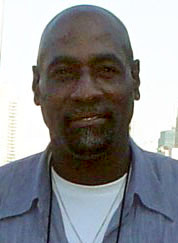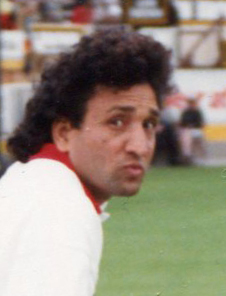Season overview
| Start date [lower-alpha 1] | Teams [lower-alpha 2] | Results (matches) | ||||
|---|---|---|---|---|---|---|
| Home | Away | Test | ODI | FC | LA | |
| 3 June 1976 | 0–3 (5) | 0–3 (3) | — | — | ||
| 19 June 1976 | 0–0 (3) | 2–1 (3) | — | — | ||
| 7 August 1976 | — | — | 0–0 (1) | — | ||
| 27 August 1976 | 0–1 (1) | 0–1 (1) | — | — | ||
| International cricket |
|---|
| in 1975–76 | in 1976–77 |
The 1976 International cricket season was from May 1976 to August 1976. [1] [2]
| Start date [lower-alpha 1] | Teams [lower-alpha 2] | Results (matches) | ||||
|---|---|---|---|---|---|---|
| Home | Away | Test | ODI | FC | LA | |
| 3 June 1976 | 0–3 (5) | 0–3 (3) | — | — | ||
| 19 June 1976 | 0–0 (3) | 2–1 (3) | — | — | ||
| 7 August 1976 | — | — | 0–0 (1) | — | ||
| 27 August 1976 | 0–1 (1) | 0–1 (1) | — | — | ||

The West Indies travelled to England on the back of a busy schedule which had seen them play Australia and India during the 1975–76 season, which led some commentators to speculate that they might be jaded. [3] The first two Test matches were drawn; the Wisden editor blamed the West Indies' lack of a spin bowler as preventing them from winning the first match, [4] while in the second match a whole day was lost to rain with England on top. [5] The West Indies won the three remaining Test matches to win the series 3–0, largely due to their fast bowlers. Viv Richards scored two double centuries, and finished as the leading run-scorer on either team, despite missing the second Test with an injury. [6]
In the three-match One Day International series, Richards was again dominant in the first two games, scoring 119 and 97 to help the West Indies to victories. In the third ODI, when Richards was dismissed without scoring, Gordon Greenidge scored 42 and Clive Lloyd made 79 to guide their side to a 50-run win. The last two matches were each affected by rain; the second ODI was spread over two days, while the third utilised the reserve day after no play was possible at all on first day. [7]
| Test no. | Date | Venue | Result |
|---|---|---|---|
| 777 | 3–8 June | Trent Bridge, Nottingham | Match drawn |
| 778 | 17–22 June | Lord's, London | Match drawn |
| 779 | 8–13 July | Old Trafford, Manchester | West Indies won by 425 runs |
| 780 | 22–27 July | Headingley, Leeds | West Indies won by 55 runs |
| 781 | 12–17 August | The Oval, London | West Indies won by 231 runs |
| ODI no. | Date | Venue | Result |
|---|---|---|---|
| 37 | 26 August | Old Trafford, Manchester | West Indies won by 6 wickets |
| 38 | 28–29 August | Lord's, London | West Indies won by 36 runs |
| 39 | 30–31 August | Edgbaston, Birmingham | West Indies won by 50 runs |
The Australia national women's cricket team was invited to England to help celebrate the fiftieth anniversary of the Women's Cricket Association. [9]
| Test no. | Date | Venue | Result |
|---|---|---|---|
| 49 | 19–21 June | Old Trafford, Manchester | Match drawn |
| 50 | 3–5 July | Edgbaston, Birmingham | Match drawn |
| 51 | 24–27 July | The Oval, London | Match drawn |
| ODI no. | Date | Venue | Result |
|---|---|---|---|
| 21 | 1 August | St Lawrence Ground, Canterbury | Australia won by 87 runs |
| 22 | 4 August | Lord's, London | England won by 8 wickets |
| 23 | 8 August | Trent Bridge, Nottingham | England won by 9 wickets |
| Match no. | Classification | Date | Venue | Result |
|---|---|---|---|---|
| 31,204 | First-class | 7–10 August | Hamilton Crescent, Glasgow | Match drawn |
| 14,455 | Unclassified 60-over match | 8 August | Titwood, Birmingham | Scotland won by 102 runs |
| Youth Test no. | Date | Venue | Result |
|---|---|---|---|
| 4 | 27–30 August | Queen's Park Oval, Port of Spain, Trinidad and Tobago | England won by 22 runs |
| Youth ODI no. | Date | Venue | Result |
|---|---|---|---|
| 1 | 31 August | Guaracara Park, Pointe-a-Pierre, Trinidad and Tobago | England won on faster scoring rate |

Sir Curtly Elconn Lynwall Ambrose KCN is an Antiguan former cricketer who played 98 Test matches for the West Indies. Widely acknowledged as one of the greatest fast bowlers of all time, he took 405 Test wickets at an average of 20.99 and topped the ICC Player Rankings for much of his career to be rated the best bowler in the world. His great height—he is 6 feet 7 inches (2.01 m) tall—allowed him to make the ball bounce unusually high after he delivered it; allied to his pace and accuracy, it made him a very difficult bowler for batsmen to face. A man of few words during his career, he was notoriously reluctant to speak to journalists. He was chosen as one of the Wisden Cricketers of the Year in 1992; after he retired he was entered into the International Cricket Council Hall of Fame and selected as one of West Indies all-time XI by a panel of experts.

Courtney Andrew Walsh OJ is a former Jamaican cricketer who represented the West Indies from 1984 to 2001, captaining the West Indies in 22 Test matches. He is a fast bowler and considered one of the all-time greats, best known for a remarkable opening bowling partnership along with fellow West Indian Curtly Ambrose for several years. Walsh played 132 Tests and 205 ODIs for the West Indies and took 519 and 227 wickets respectively. He shared 421 Test wickets with Ambrose in 49 matches. He held the record of most Test wickets from 2000, after he broke the record of Kapil Dev. This record was later broken in 2004 by Shane Warne. He was the first bowler to reach 500 wickets in Test cricket. His autobiography is entitled "Heart of the Lion". Walsh was named one of the Wisden Cricketers of the Year in 1987. In October 2010, he was inducted into the ICC Cricket Hall of Fame. He was appointed as the Specialist Bowling Coach of Bangladesh Cricket Team in August 2016.
Alan Philip Eric Knott is a former cricketer who represented England at international level in both Tests and One-Day Internationals (ODI). Knott is widely regarded as one of the most eccentric characters in cricket and as one of the greatest wicket-keepers ever to play the game. He was described by cricket journalist Simon Wilde as "a natural gloveman, beautifully economical in his movements and armed with tremendous powers of concentration".

Sir Leonard Hutton was an English cricketer. He played as an opening batsman for Yorkshire County Cricket Club from 1934 to 1955 and for England in 79 Test matches between 1937 and 1955. Wisden Cricketers' Almanack described him as "one of the greatest batsmen in the history of cricket". He set a record in 1938 for the highest individual innings in a Test match in only his sixth Test appearance, scoring 364 runs against Australia, a milestone that stood for nearly 20 years. Following the Second World War, he was the mainstay of England's batting. In 1952, he became the first professional cricketer of the 20th century to captain England in Tests; under his captaincy England won the Ashes the following year for the first time in 19 years.

Sir Isaac Vivian Alexander Richards is an Antiguan retired cricketer who represented the West Indies cricket team between 1974 and 1991. Batting generally at number three in a dominant West Indies side, Richards is widely regarded as one of the greatest batsmen of all time. Richards helped his team win the 1979 Cricket World Cup.

Shivnarine "Shiv" Chanderpaul CCH is a Guyanese cricket coach and former captain of the West Indies cricket team. Considered one of the greatest batsmen of his era, Chanderpaul is the 10th highest run scorer of all time in International cricket and the 8th highest in Test cricket. Chanderpaul was a member of the West Indies team that won the 2004 ICC Champions Trophy, and in the 2004 ICC Champions Trophy Final, he had the highest contribution for West Indies with the bat, scoring 47 runs.
Sir Cuthbert Gordon Greenidge is a Barbadian retired cricketer who represented the West Indies in Test and One-day Cricket for 17 years, as well as Barbados and Hampshire in first-class cricket. Greenidge is regarded worldwide as one of the greatest and most destructive opening batsmen in cricket history. In 2009, Greenidge was inducted into the ICC Cricket Hall of Fame.

Abdul Qadir Khan SI was an international cricketer who bowled leg spin for Pakistan. Abdul Qadir is widely regarded as a legendary leg spinner from the 1970s and 1980s and was a role model for up and coming leg spinners. Qadir was voted the best player in the Group B matches of the 1987 Cricket World Cup and won a car which he donated to Imran Khan for his Shaukat Khanum Memorial Cancer Hospital and Research Centre project. Later he was a commentator and Chief Selector of the Pakistan Cricket Board, from which he resigned in 2009 due to differences of opinion with leading Pakistan cricket administrators.

The Wisden Trophy was awarded to the winner of the Test cricket series played between England and the West Indies. It was first awarded in 1963 to commemorate the hundredth edition of Wisden Cricketers' Almanack. Series were played in accordance with the future tours programme, with varying lengths of time between tours. If a series was drawn then the country holding the Wisden Trophy retained it. In 2020, it was announced that the trophy would be replaced by the Richards–Botham Trophy named after Sir Vivian Richards and Sir Ian Botham.
Peter Granville Lee, affectionately known as "Leapy", is a former cricketer who played for Northamptonshire and Lancashire County Cricket Clubs. He was a right-arm fast-medium bowler who moved the ball off the seam and became among the most effective bowlers in English county cricket during the 1970s. Presumably because his batting was impotent as shown by his highest first-class score in more than 200 matches being 26, Lee appears never to have been considered seriously for Test cricket. He toured South Africa twice with teams organised by Derrick Robins. He was born at Arthingworth, Northamptonshire.
Enid Bakewell played for the English women's cricket team in 12 Tests between 1968 and 1979, and in 23 one-day international matches. A right-handed batter and slow left-arm orthodox bowler, on her figures she has a strong claim to be regarded as the best all-rounder that the English women's game has produced. In Tests she scored 1,078 runs at an average of 59.88, with 4 centuries, as well as taking 50 wickets at an average of 16.62. In what proved to be her final Test, she scored 68 and 112* and took 10 for 75 against West Indies at Edgbaston in 1979. Her final WODI appearance was in the final of the 1982 Women's Cricket World Cup.
The West Indian cricket team played 16 first-class cricket matches in England in 1988, under the captaincy of Viv Richards. They enjoyed considerable success during the tour, while England endured a "disastrous summer" of continuous change.
The 1976 English cricket season was the 77th in which the County Championship had been an official competition. Clive Lloyd adopted a new approach to Test cricket as a battery of pace bowlers was used to intimidate the England batsmen. Lloyd adopted the tactic after his own team's experiences against Jeff Thomson and Dennis Lillee the previous year. England's batsmen were no match for Andy Roberts and Michael Holding, but even more worrying was a dearth of effective England bowlers and it was West Indian batsmen like Viv Richards and Gordon Greenidge who were the real stars of a long, hot, dry summer. Middlesex won the County Championship.
The West Indies cricket team toured England in the 2000 cricket season. West Indies played five Tests against England - two in June and three in August - with a triangular One Day International (ODI) series involving Zimbabwe in July.
The West Indies cricket team toured Australia from November 1979 to January 1980 and played a three-match Test series against the Australia national cricket team. The West Indies won the Test series 2–0, retaining the Frank Worrell Trophy.
Jason Omar Holder is a Barbadian cricketer and the former captain of the West Indies cricket team. He is a right arm medium-fast bowling all-rounder who features in all three cricketing formats. In January 2019, he was ranked as the number one all rounder in the world according to the official ICC Test rankings. In August 2019, Cricket West Indies named him as the Test Player of the Year and on 14 April 2021, Holder was named one of Wisden's Five Cricketers of the Year. Holder is the first West Indian male cricketer to take a hat-trick in a T20I, and the fifth, to achieve both 2000 runs and 100 wickets in one day internationals. He is also the second West Indian, after Sir Garfield Sobers, to attain both 2500 runs and 150 wickets in test match cricket. Holder was a member of the West Indies team that won the 2016 T20 World Cup.